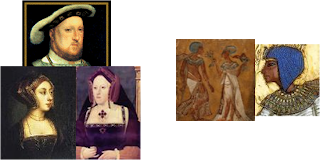
So as I have started to look into the life of Nefertiti a little bit more and have began to read the book I have noticed some very striking similarities to the Tudor Court of Henry VIII. It's amazing how these similar circumstances play out in different places and times.
First, there is a distinct love triangle/battle for power. In Egypt this is Pharaoh
Akhenaten, his Great Royal Wife Nefertiti, and his Second Wife
Kiya. In England there is King Henry VIII, his Queen Katherine of
Aragon, and his Great Love Anne Boleyn (before she became Queen). The battle for power came not only from the women themselves but also their families - Nefertiti's family and
Kiya's family are constantly fighting for power, as are the Norfolk's/Boleyn's.
Second, there is the power that Anne Boleyn and Nefertiti held. Historically, mistresses and even queens tended to have relatively little power over their husbands in issues regarding policies, but these two women were at the forefront of both. It also appears that, for awhile at least, their Kings were happy to share some of this power with them.
Third, both Anne and Nefertiti were known to make a lot of noise when their men would return to the bed of their wife. Anne, before she became Queen, would get upset when Henry would still occasionally visit Katherine's bed (being his wife) and Nefertiti would also get upset when
Ahkenaten would visit the bed of
Kiya (his lesser wife).
Fourth, Anne and Nefertiti constantly tried to get pregnant, and hopefully have a son, to put their child in the front of the line of succession. Having a son would also get rid of the issue of the King's other children. For Nefertiti:
Kiya had already had a son and she only had daughters. For Anne: there was the Princess Mary in the way and she also only had a daughter, Princess Elizabeth.
Fifth, there is the issue of a change of religion and the role that the women had in this venture.
Akhenaten wanted to change the religion from many gods led by
Amun to one god,
Aten. Nefertiti was instrumental in convincing the people to follow with this radical change and appeared to wholly embrace this change. Henry wanted to break from the Catholic Church in order to obtain his
divorce, and Anne encouraged him to create the Church of England.
Finally, if you look at the book
Nefertiti and
The Other Boleyn Girl, the stories are told from the viewpoint of the sister (Mary Boleyn and
Mutnedjmet).
My how themes stay the same over time!

Copyright © 2009 by The Maiden’s Court
 This challenge is hosted by MizB over at ReadingWise. The rules for this challenge are to set a goal for how many of your OWN books you want to read by the end of the year. I set my goal for 10 books. I think that is a reasonable goal. Here I will post my progress.
This challenge is hosted by MizB over at ReadingWise. The rules for this challenge are to set a goal for how many of your OWN books you want to read by the end of the year. I set my goal for 10 books. I think that is a reasonable goal. Here I will post my progress.









 This painting is inspired by the Ancient Greek myth that Zeus came to Leda in the form of a Swan and inpregnated her. She later gave birth to 2 children - 1 being that of Zeus and 1 from her husband. Michelangelo's painting was lost - or destroyed - but his image survives today because of many reproductions done by other artists. According to the book Francis I by R.J. Knecht, Francis I had added this painting to his collection along with many other Florentine artists.
This painting is inspired by the Ancient Greek myth that Zeus came to Leda in the form of a Swan and inpregnated her. She later gave birth to 2 children - 1 being that of Zeus and 1 from her husband. Michelangelo's painting was lost - or destroyed - but his image survives today because of many reproductions done by other artists. According to the book Francis I by R.J. Knecht, Francis I had added this painting to his collection along with many other Florentine artists.












 I would like to pass this award on to Annie at
I would like to pass this award on to Annie at 
